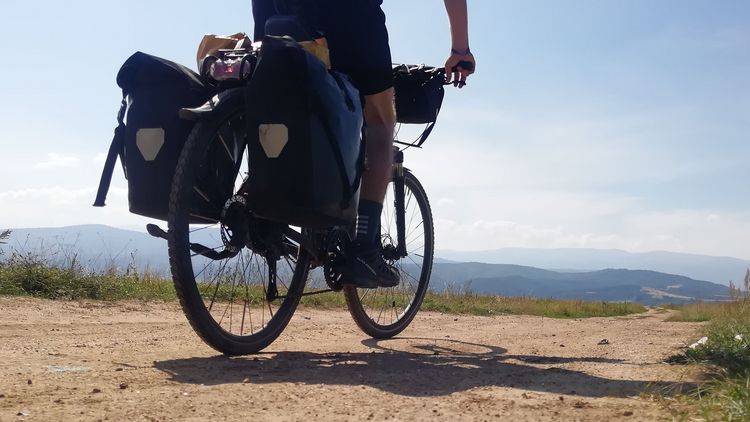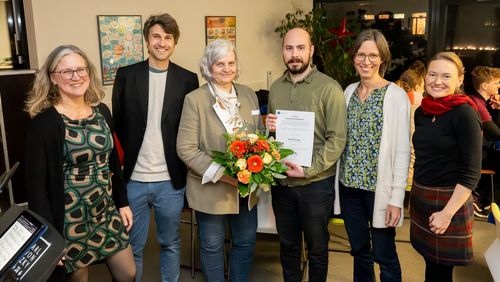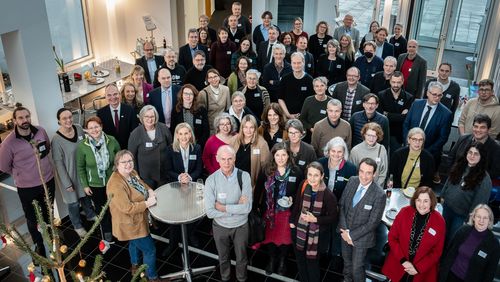As well as supporting mobility in higher education, the European Erasmus+ programme aims to promote social change towards more sustainability. The University of Oldenburg is supporting this goal in its own special way.
Eleven European countries, several mountain ranges and 5221 kilometres – business education student Lennart Zembsch has a pretty impressive track record for his late-summer bike tour. It took him all the way from Oldenburg to the port city of Piraeus in Greece, where he is currently doing an Erasmus exchange semester. "Europe in its entirety has become more tangible for me," said Zembsch after his two-month journey across the European continent from the North Sea to the Bosporus.
This is a great example of how travel doesn't always have to be fast, says Christa Weers, deputy director of the university's International Office (IO). "The slower you travel, the more you learn about yourself, the changing landscapes, the people and the languages," she adds. Weers has been coordinating the European Erasmus+ Mobility programme for almost 20 years. She and her team supervise and advise both students and university staff who want to spend time abroad in other European countries via the programme. "Wherever students go, they can discover wonderful things. And afterwards they see Europe through different eyes," she says.
Promoting the shift to sustainability
The Erasmus programme, now Erasmus+, has grown to become the world's largest education and student mobility programme. Before the pandemic, each year more than 33,000 students across Germany received funding for an Erasmus study visit. The programme has a total budget of 26 billion euros for the period 2021 to 2027. What is more, not only does the programme make it possible for individual students to spend one or two semesters abroad at a European university. But it also has focused on building and expanding networks among educational institutions, teachers and staff – not only in Europe but across the globe. The aim is to "influence society, for example by promoting the European project at universities," says Jenka Schmidt, head of the IO.
Integrating the big ideas that enter the universities via the Erasmus programme into everyday life is certainly a challenge, notes Schmidt. With its Green Erasmus project, which is based on the European Union's Green Deal, the new generation of the programme shifts the focus to topics such as climate protection and sustainability. On the one hand it aims to promote a general shift towards a more sustainable world. More specifically, it aims to reduce the carbon footprint of the Erasmus+ programme, explains Weers.
It is here that higher education institutions can take direct action and, for example promote sustainable travel. For instance, students who travel to their Erasmus partner university using an environmentally friendly means of transport such as buses or trains can apply for a special grant of 100 euros. The only catch is that the funding programme does not encompass especially sustainable means of travel such as cycling or even walking.
Setting an example for other universities
This meant that when Lennart Zembsch told the International Office about his idea of travelling to Greece by bike, there were no special grants to support his project. "But we thought it was such a great idea that we really wanted to help finance it. So we developed our own concept which basically also allows us to fund travel on foot or by bike," says Erasmus coordinator Weers. The result: Oldenburg students who use these super sustainable travel options can now receive 350 euros for distances over 200 kilometres and 200 euros for shorter distances.
The staff at the International Office don't expect the special grants to trigger a massive wave of bike travel. "But it was important to us to use the funding to create a programme that could serve as a model for other universities," Weers stresses, echoing the Erasmus concept of promoting social change. Lennart Zembsch is also very keen on the idea. He hopes that his tour will inspire others to take up cycling and prompt more people to think twice about "whether flying is really necessary".




![[Translate to English:] Portrait Christa Weers, Assistant head of the International Office.](/fileadmin/_processed/0/2/csm_Christa_Weers_neu_ds_7188904f6b.jpg)


